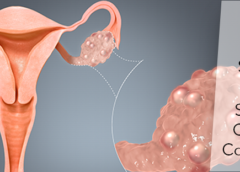Overview
A hormonal condition common to women of reproductive age is the polycystic ovary syndrome (PCOS).Women with PCOS may have frequent or prolonged menstrual periods or excessive male hormone levels.
It is unclear what reason for PCOS. The risk of long-term complications including type 2 diabetes and heart disease can be reduced by early diagnosis and treatment along with weight loss.
Symptoms
PCOS signs and symptoms frequently evolve during puberty, around the time of the first menstrual cycle. For example, PCOS often evolves later, in response to a large weight gain.
PCOS signs and symptoms differ accordingly. When you encounter at least two of those symptoms, a diagnosis of PCOS is made:
Irregular periods: The most prominent symptom of PCOS is the recurrent, irregular, or prolonged menstrual cycles. You may have less than nine cycles a year, for example, more than 35 days between cycles, and abnormally heavy periods.
Read Also:Premenstrual Syndrome: Symptoms, Risk Factor, And Treatment
Excess androgen: High levels of male hormone can lead to physical signs such as excess facial and body hair (hirsutism) and often extreme acne and baldness of male patterns
Polycystic ovaries: Your ovaries might be enlarged and contain follicles that surround the eggs. As a result, the ovaries will fail to function regularly.
Signs and symptoms of PCOS usually become more severe when you are obese.
When to see a doctor
Check with your doctor if you have worries regarding your menstrual cycles, if you are experience infertility, or whether you have symptoms of excess androgen, like worsening hirsutism, acne, and male-pattern baldness.
Causes
The exact cause of PCOS isn’t known. Factors that might play a role include:
- Excess insulin: Insulin is the hormone produced in the pancreas that which cells to use sugar, the primary energy supply of your body. If your cells become resistant to the action of insulin, then your blood sugar levels can rise and your body might produce more insulin. Excess insulin can increase the androgen development, which can cause ovulation problems
- Low-grade inflammation: This concept is used to describe white blood cells’ development of substances for preventing infection. Research has shown that in women with PCOS have low-grade forms of inflammation that causes polycystic ovaries to produce androgens, which can cause problems with the heart and blood vessels.
- Heredity: Research suggests that certain genes might be linked to PCOS.
- Excess androgen: The ovaries produce abnormally high levels of androgen, which resulting in acne and hirsutism.
Read Also:Cholesterol: Risk Factors, Symptoms, Causes, Diagnosed And Treatment
Complications
PCOS Complications may include:
- Infertility
- Gestational diabetes or pregnancy-induced hypertension
- Miscarriage
- Nonalcoholic steatohepatitis — an extreme hepatic inflammation caused by fat accumulation in the liver
- Metabolic syndrome — a combination of conditions involving high blood pressure, elevated blood sugar, and excessive cholesterol or triglyceride levels that increase the cardiovascular disease risk significantly.
- Type 2 diabetes or prediabetes
- Sleep apnea
- Depression, anxiety and disorders of eating
- Abnormal uterine bleeding
- Cancer of the uterine lining
Obesity is associated with PCOS, which may worsen disease complications.
Diet and lifestyle tips to treat PCOS
Treatment for PCOS typically starts with changes in lifestyle, such as weight loss, diet, and exercise.
Losing only 5-10% of your body weight will help you control your menstrual cycle and improve the symptoms of PCOS. Weight reduction can also raise cholesterol levels, lower insulin levels and decrease the risk of heart disease and diabetes.
Read Also:Food To Keep Fit Yourself During LockDown Period
Any diet which helps you in weight loss may be of assistance to your condition. Many diets may however have benefits over others.
Studies comparing diets for PCOS have showed that low-carbohydrate diets to be efficient for both weight loss and insulin lowering. A low-glycemic (low-GI) diet that gets its carbohydrates from fruits, vegetables, and whole grains helps regulate the menstrual cycle better than a regular weight loss diet.
from few studies it have showed that 30 minutes of moderate-intensity exercise at least three day in a week can help women with PCOS lose weight. With exercise, weight loss also enhance ovulation and insulin levels.
Exercising combined with a balanced diet is even more benefited. Diet plus exercise helps you lose more weight than treatment alone and reduces your diabetes and heart disease risks.
There is some evidence that acupuncture can help to improve PCOS but there is a need for further research.

Leave a Reply
You must be logged in to post a comment.